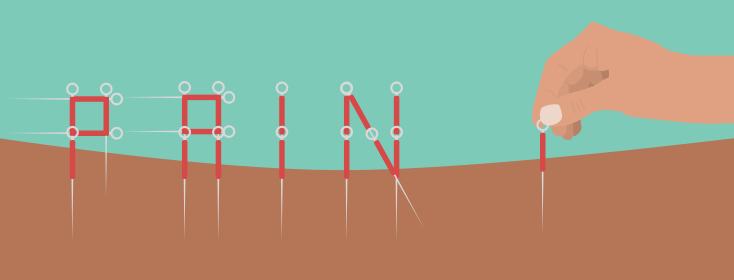My Strategies for Dealing with Pain
Between IBS and fibromyalgia, I have some amount of pain every day. Most days, it’s at a low level, and I can mostly ignore it. But sometimes, pain refuses to be pushed to the back burner and roars so loudly I can’t focus on anything but breathing.
The pain from IBS tends to be localized to my abdomen. The pain from fibromyalgia may be localized, localized in several areas, or general aches all over. Both conditions can create either dull pain or sharp, intense pain.
Having pain be a frequent visitor has given me the opportunity to try a lot of different approaches. As I’ve written before regarding IBS, I like to have a bag of tricks to go to when things get tough, because the same remedy doesn’t work 100% of the time. Here are things that work for me when I’m experiencing pain:
- Acupuncture
I’m a big fan of acupuncture, which is part of traditional Chinese medicine and uses very fine needles placed on different spots on the body. I first tried it when I was in excruciating back pain and was pleasantly surprised how well it works. Acupuncture has been studied for its beneficial effects on pain. It may take several treatments to get the full effect. - Over-the-counter (OTC) pain medications
On occasion, I’ll use OTC pain medications, like ibuprofen or acetaminophen, but I don’t like to use them too often. Like prescription medications, OTC medications can cause side effects, especially if used for long periods of time or in higher than recommended doses. Talk to your doctor and use these as directed. - Balance activity and rest
Sometimes when the pain in my body gets intense, I don’t want to do much activity at all, but I’ve found too much resting can also worsen the pain. The trick for me is to find a balance between some activity – even gentle activities like stretching, a short walk, or yoga – and resting, knowing that every day is different as far as how much my body can handle. - Massage
I love to get a good massage, and I’ve got a wonderful massage therapist that I try to see regularly. I’d like to go more often than I do, but it’s an additional expense I have to budget for. - Mind-body approaches
Being a life coach, I’ve been trained in some mind-body tools that can be helpful when dealing with physical symptoms like pain. The one that helps me the most is described below.
Give it space
Often when we have uncomfortable sensations or emotions, we try to avoid them or push them away. This denial can sometimes work for a while…until it doesn’t. As I mentioned, I can sometimes ignore the pain in my body, but during those times when the pain is so intense it literally takes my breath away, I know it’s time to pay attention. (In those cases, it’s hard to do anything BUT be in pain anyway.) I’ve learned that, like emotions, the pain gets better, or at least easier to handle, if I can give it space. What I mean by that is to allow the pain to be there. That might sound strange, after all, it IS there. But somehow this works.
First, I relax my body as much as possible, as pain frequently causes us to tense our muscles and relaxing whichever muscles you can helps it ease up. Then, I breathe deeply (or as deeply as I can comfortably), and I mentally allow the pain to be present in my awareness. Sometimes, just that – allowing the pain to be there without trying to make it change – is enough for the pain to start to ease. Another mind-body approach is to ask the pain (or the part of the body which is experiencing the pain) what it’s message is as a way of tuning in to our body’s intuition. The message might be to stop doing something or you might get a hunch to reach for a particular remedy.
Living with chronic pain
I think pain is a powerful motivator: it motivates you to find ways to stop it! However, it’s also exhausting and disheartening at times to live with chronic pain, and stopping it isn’t always possible. Finding others who understand can be helpful, and sometimes all you can do is experiment to find what helps you cope.

Join the conversation